ESL Eating Out Vocabulary
Eating is vital for everyone, and the ESL eating out vocabulary on this page will enable you to eat out in a restaurant or at a fast food stall. By learning the vocabulary on this page you will be able to understand when people talk about going to eat out.
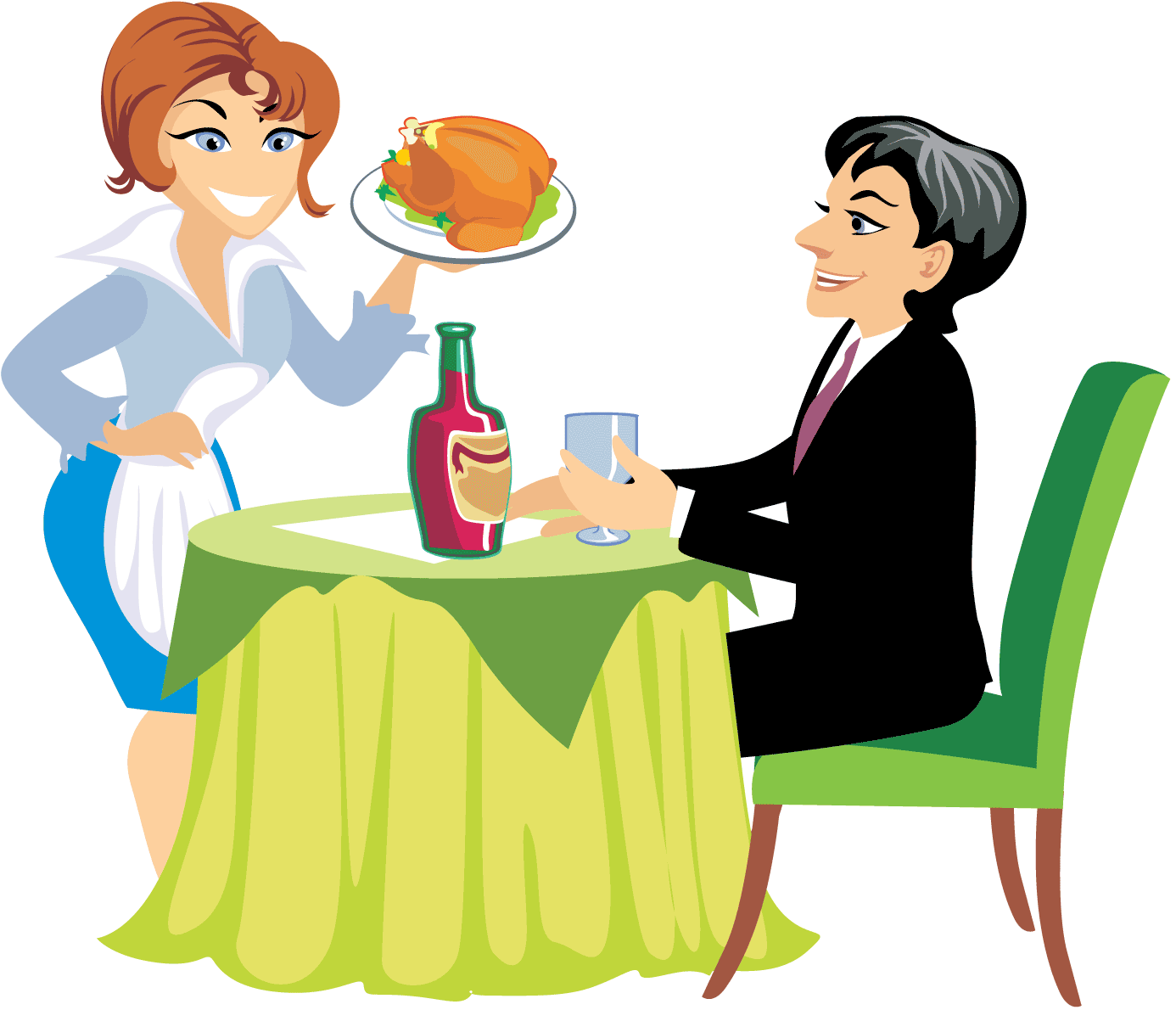
To start this page has a vocabulary list with many items related to eating out. Each of these words or phrases has a simple definition so you can learn what they mean. The list is followed by flashcards of the vocabulary that you can download and use to learn the vocabulary. Many of the flashcards also have a picture of the vocabulary item to help you learn them all. You should print the flashcards out so that you can take them with you to learn the vocabulary whenever you have some free time.
Then after that there are two recordings of the ESL eating out vocabulary being spoken by a native English speaker so you can hear the correct pronunciation. Firstly there is a simple recording that you can listen to, and then there is a video of the flashcards with the words being spoken at the same time as the matching flashcard is shown. You can listen to these as often as you need to.
Then finally there are 3 exercises that you can do. These will test how well you have learnt the ESL eating out vocabulary. They are as follows:
- Identify the correct definition for a given word.
- Identify the correct word that matches a given definition.
- Identify the correct word that matches a given picture of a vocabulary item.
ESL Eating Out Vocabulary List with Definitions
The list of ESL eating out vocabulary items that follows this has many words that you will need to know to be able to talk about eating out. Each word has a simple definition following it. After this there are flashcards of the vocabulary for you to download. Then there are recordings of the vocabulary so you can hear the correct pronunciation as spoken by a native English speaker.
A la carte: Without a side dish. (adjective)
A la mode: 1) In the current style. (adjective) 2) With ice cream. (adverb)
All you can eat: Customers pay one fee and can eat as much as they wish. (adjective)
Appetizer: A small snack before a meal; starter. (noun)
Bar: A building or room where alcoholic drinks and sometime food are served. (noun)
Bill: A statement of charges for food or drink. (noun)
Bistro: A small restaurant or bar. (noun)
Blacken: To cook meat at a high heat in a lot of pepper and other spices. (verb)
Booking: An arrangement made with a restaurant in advance, to eat there at a particular time. (noun)
Booster seat: A plastic unit that fits on top of a chair to help small children reach the table. (noun)
Buffet: Self-serve tables of food that are set out for the customers to pick and choose from. (noun)
Busboy: A person who helps out in a restaurant (especially clearing and setting tables). (noun)
Café: A small restaurant selling light meals and drinks. (noun)
Canteen: A small cafeteria or snack bar, usually in a workplace. (noun)
Chip shop: A fast food outlet that sells fish and chips. (noun)
Cocktail: An alcoholic drink mixed with juice. (noun)
Complementary: Free of charge. (adjective)
Combo meal: A meal as a set combination, such as a burger with fries and a drink. (noun)
Course: A part of a meal. (noun)
Cutlery: Tools for eating with (fork, knife, spoon). (noun)
Deli: A store where you can buy foods (such as meats, cheese, salads and sandwiches) that are already cooked or prepared. (noun)
Dessert: Sweet food eaten after the main part of a meal. (noun)
Dine: 1) To eat dinner. (verb) 2) To have the main meal of the day. (verb)
Dish: Food that is prepared in a particular way. (noun)
Doggie bag: Unfinished food that is packed up for the customer to take home. (noun)
Double: Two shots (ounces) of alcohol in one drink. (adjective)
Dressing: A liquid topping for salads. (noun)
Entrée: The main course (usually at fancier restaurants). (noun)
Fast food: Food that is quick and inexpensive. (noun)
Fine dining: A style of eating that usually takes place in expensive restaurants. (adjective)
Free refills: Beverages that can be filled again without any cost. (noun)
Garnish: Food that is added to a plate for appearance or color. (noun)
Halal: Dishes that Muslims can eat. (adjective)
Happy hour: A short amount of time when alcoholic drinks are at a reduced price. (noun)
Host/Hostess: A staff member in charge of greeting and seating customers in a restaurant. (noun)
House wine: Cheaper wine. (noun)
Kosher: Dishes that Jewish people can eat. (adjective)
Lineup: A number of people waiting for something. (noun)
Liquor: Distilled alcoholic drinks. (noun)
Liqueur: Alcohol drink that has a syrup/sweet taste. (noun)
Main course: The largest part of a meal, usually consists of a meat, vegetable and a starch. (noun)
Meal: An occasion when food is eaten, or the food that is eaten on such an occasion. (noun)
Medium rare: Meat cooked so that it is slightly red in the middle. (adjective)
Menu: A booklet or printed list of all the food that can be ordered. (noun)
Napkin: A cloth or folded piece of soft paper that is used to mop up spilt food. (noun)
On the side: A request for a food item to be served in a separate container. (adjective)
Order: 1) To ask for something (food) to be made. (verb) 2) A request to make, supply, or deliver food. (noun)
Overdone: Food that is cooked too long but can still be eaten. (adjective)
Pizzeria: A restaurant where mainly pizzas are served. (noun)
Pub: A building in which alcoholic drinks are sold and consumed. (noun)
Rare: Food cooked just a short time so as to retain redness. (adjective)
Reservation: A request to have a table saved for a certain amount of people. (noun)
Restroom: A place for people to use a toilet and wash hands. (noun)
Roll-up: A set of cutlery wrapped in a napkin. (noun)
Root beer: A non-alcoholic drink made from herbs and plants that tastes similar to cola. (noun)
Rush: A large amount of customers arriving at the same time. (noun)
Salad: A dish composed of uncooked plants. (noun)
Salad bar: A kind of buffet for salad and cold food. (noun)
Self-serve: The customers bring their own food items to the table and do not pay for service. (adjective)
Senior’s discount: A reduced price for people over a certain age (i.e. over 65). (noun)
Serve: To look after a customer and bring them their order. (verb)
Server: A person who brings your food and drinks at a restaurant; a waiter or waitress. (noun)
Set meal: A special meal that a restaurant offers on a particular day. (noun)
Set menu: A list of dishes you can order together (such as a main meal, a starter and a dessert) for a set price. (noun)
Side dish: A small portion of food, typically bread, salad, or vegetable in sauce, that you eat with a main meal. (noun)
Specials: Items that are prepared particularly for a certain day and are usually at a reduced price. (noun)
Specialty: Food item that a restaurant is popular for. (noun)
Stay: To eat a meal in the restaurant. (verb)
Starter: A small portion of food served as the first course of the meal. (noun)
Sundae: A tall glass of ice cream with chocolate sauce and nuts on top. (noun)
Sweet: A sweet food served at the end of a meal; dessert. (noun)
Take-out/Take-away: Food that is packed up and eaten at home. (noun)
The works: All of the options that come with the meal. (noun)
Tip: A small sum of money often given to restaurant staff for good service. (noun)
To go: To take a meal out of the restaurant to eat somewhere else. (adjective)
Waiter/Waitress: A man/woman who serves food or drinks to people in a restaurant. (noun)
Well-done: Cooked completely. (adjective)
Wrap: A thin, flat piece of bread with filling in the middle. (noun)
Vocabulary Flashcards for Eating Out Words
Either click on the following picture or link to download the ESL eating out vocabulary flashcards. Then you can print them to use when you are working offline.
Eating out vocabulary flashcards
Spoken Eating Out Vocabulary
The following are two recordings of the ESL eating out vocabulary being spoken by a native English speaker. The first just has a recording of the vocabulary items that you can listen to, while the second is a video of the eating out flashcards with the spoken words matching the word on the flashcard that is being shown.
ESL Eating Out Vocabulary Exercises
Exercise 1 – Correct Definition
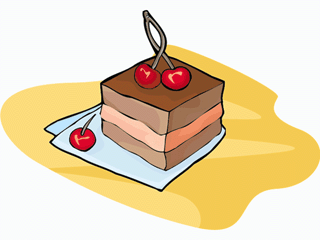
For the first ESL eating out vocabulary exercise you need to choose the correct definition (A-D) in each of the 5 questions that matches the given word. Once you have finished you can click the get score button to see how many you got correct.
ESL Eating Out Vocabulary Definitions
Choose the correct definition for the eating out vocabulary in this quiz.
Exercise 2 – Correct Meaning
The second ESL eating out vocabulary exercise has a definition being given in each question and you have to choose the correct word (A-D) that matches it. When finished you can see the correct answers by clicking the get score button.
ESL Eating Out Vocabulary Identification of Meaning
Choose the word that matches the definition given in each of the five questions in this quiz.
Exercise 3 – Identify Picture
In the third ESL eating out vocabulary exercise you need to choose the correct word (A-D) in each of the 5 questions that match the pictures given below. Once you have done this you can use the get score button to see the correct answers and your score for the task.
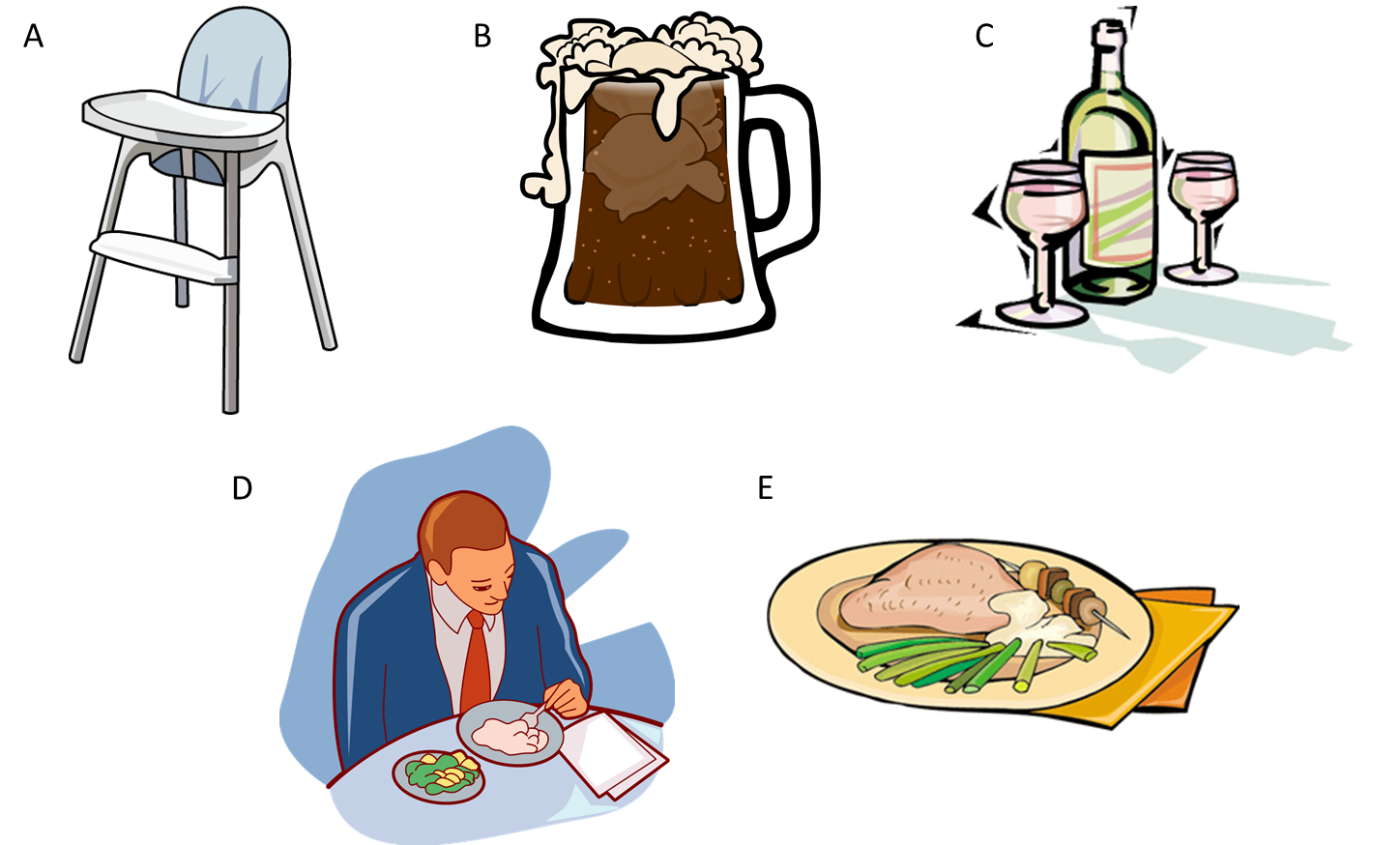
ESL Vocabulary Picture Descriptions
Identify the best description for each of the images (A-E) given above that correspond to the five questions in this quiz.
ESL 4u home › Vocabulary › Eating out
Other Pages about Eating Out that You Might
Like
ESL Eating Out Conversations
ESL Eating Out Listening
ESL Eating Out Reading
ESL Eating Out Writing


|
|
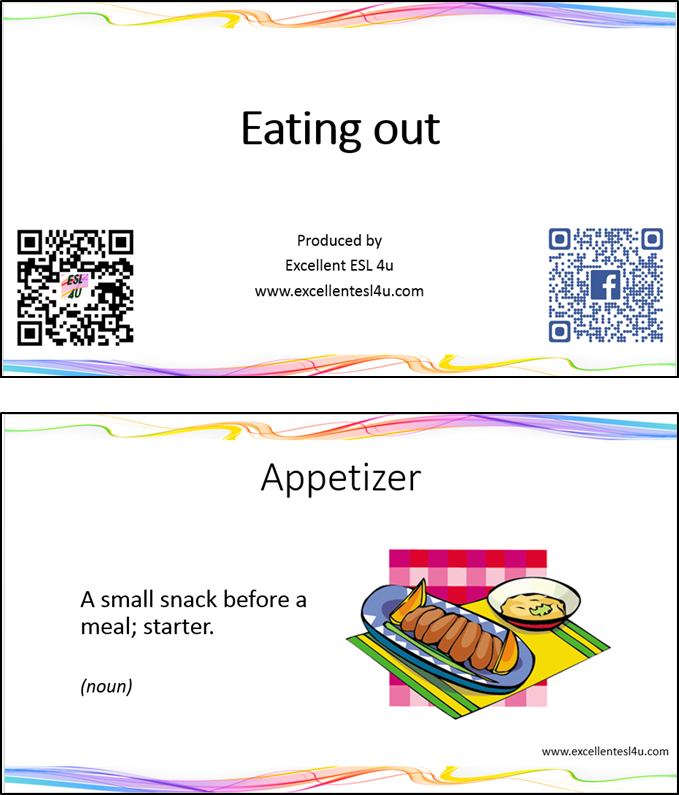

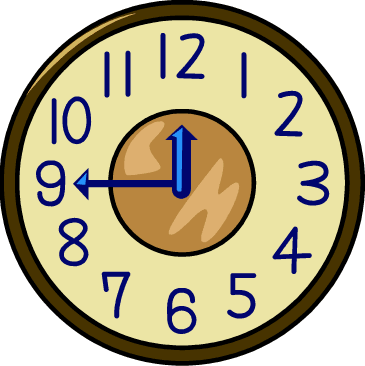
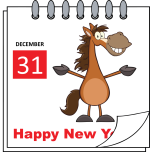
New! Comments
Have your say about what you just read! Leave me a comment in the box below.